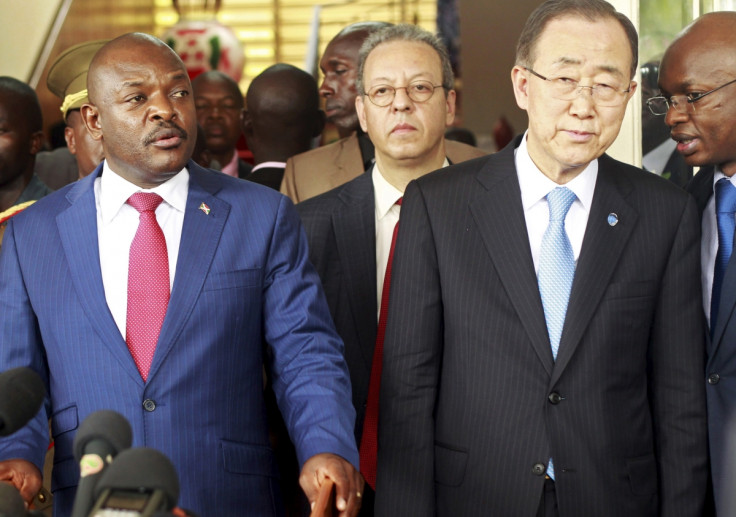Burundi: President Nkurunziza agrees to release of 2,000 prisoners and 'inclusive dialogue'

After an hour of discussion with the Burundi's embattled President Pierre Nkurunziza, the United Nations Secretary General Ban Ki-moon announced that the head of state had promised to release 2,000 prisoners and to do everything to enable an inclusive dialogue.
Burundi was thrown into crisis in April 2015 when Nkurunziza decided to run for a controversial third term, that he went on to win in July. The conflict has so far killed up to 900 people. Scores of bodies are reportedly still being found in the streets, in tit-for-tat violence pitting pro-Nkurunziza forces and insurgents, in a region where memories of Rwanda's 1994 genocide are still strong.
Ban Ki-moon landed on Monday (22 February) for an official visit during which he met Nkurunziza and other actors in support of ongoing UN efforts at resolving Burundi's political crisis.
Ban Ki-Moon: Arrest warrants cancellation 'good sign'
Three days before Ban Ki-moon's arrival, Burundi Attorney General Valentin Bagorikunda on Friday (19 February) cancelled arrest warrants against 15 officials from opposition parties, the civil society and media, most of whom are in exile.
During a press conference on Tuesday (23 February), Bank Ki-moon said that the cancellation of arrest warrants for members of the opposition and representatives of the civil society is a "good sign". "The president called me this morning to confirm that he will release 2,000 prisoners" the Secretary General told reporters in the capital Bujumbura, before concluding that the Burundian people needed to return to peace and that it could afford no mistakes.
Nkurunziza, meanwhile, said that the visit was important, and had allowed him to strengthen relations between Burundi and the United Nations. "Burundi is grateful to the UN for its support and for the commitment you have made here to perpetuate it," Nkurunziza told the Secretary General.
Promise of an inclusive dialogue
The head of state said the organisation of the dialogue on the outside should consider "all components of Burundians who have left the country for a very long time".
Talking about Burundi's painful past, Nkurunziza told Bank Ki-moon that the contribution of the UN to Burundi "cannot be underrated", according to the Presidency Spokesman, Gervais Abayeho. Referring to the fact that "the putschist spirit did not begin in 2015 but long before", Nkurunziza claimed "some opposition figures vowed to overthrow elected institutions since 2012".
The regime repeated its claims that Rwanda was involved in destabilising Burundi, and asked the UN to help it arrest "those aiding and abetting violence" in Burundi from outside. "The solution to our security should be to tackle the root cause of the problem: where deadly weapons come from," Nkurunziza is reported to have told the UN delegation.
Read more: Burundi's opposition responds to Nkurunziza's promises to Ban Ki-moon
Ban Ki-moon so far seemed to have failed to ensure Bujumbura would accept a peacekeeping force. The French News Agency reported on Monday (22 February) that France had put forward a draft proposal at the United Nations to deploy a UN police force in Burundi to help quell the violence. Burundi's Foreign Affairs Minister Alain Nyamitwe, however, said if Burundi were to be consulted it would not accept the deployment of any such force and would not accept any such force through the United Nations.
Meanwhile, the government insisted that security had improved in the country, with Nkurunziza adding: "Security is a reality in Burundi, there's free circulation of goods and people".
© Copyright IBTimes 2025. All rights reserved.






















